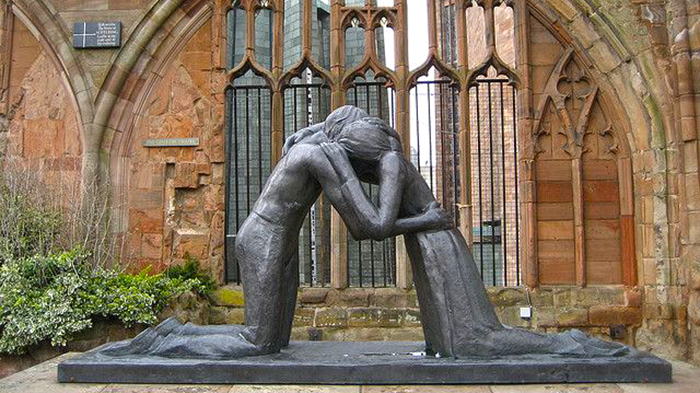
Fr. Ron Rolheiser writes that when he was younger, he was pretty confident that he knew what love meant. After all, we all experience love in some way: being in love, loving someone, being loved by someone. Virtually everyone has known the love of somebody, a friend, a family member, or an acquaintance. The more we age, the more we also begin to know love’s dark side: We fall in love and think it will last forever, but then fall out of love, feel love go sour, feel love grow cold, see love betrayed, feel ourselves wounded by love, and wound others. Finally, even more upsetting, we all find that there are always people in our lives who are cold, bitter, and unforgiving towards us, so it is not always easy to feel love and be loving. Jesus commanded us to “Love one another as I have loved you!” We too easily read that simplistically, romantically, and in a one-sided, over-confident manner. But this command contains the most important challenge of the whole gospel and, like the deepest part of the gospel to which it is linked, the crucifixion, it is very, very difficult to imitate. Why? It’s easy to consider ourselves as loving if we only look at one side of things, namely, how we relate to those people who are loving, warm, respectful, and gracious towards us. But if we begin to look at the skeletons in our relational closets, our naive confidence will soon disappear. What about the people who hate us, whom we don’t like? What about the people whom we avoid and who avoid us? What about those people towards whom we feel resentment? What about all those people with whom we are at odds, towards whom we feel suspicion, coldness, and anger? What about those people whom we haven’t been able to forgive? It’s one thing to love someone who adores you, and it’s quite another to love someone who wants you dead! But that’s the real test. Jesus’ command to love contains a critical subordinate clause, “as I have loved you!” What was unique in the way he loved us? More than any creedal formula or other moral issue, the command to love and forgive your enemies is the litmus test for Christian discipleship. We can ardently believe in and defend every item in the creed and fight passionately for justice in all its dimensions, but the real test of whether or not we are followers of Jesus is the capacity or non-capacity to forgive an enemy, to remain warm and loving towards someone who is not warm and loving to us. That’s the hard, non-negotiable truth underlying Jesus’ command to love, and when we are honest, we have to admit that we are still a long way from measuring up to that. There’s a sobering challenge in an old Stevie Nicks song, Golddust Woman: She suggests that it’s good that, at a point in life, someone “shatters our illusion of love” because far too often, blind to its own true intentions, our love is manipulative and self-serving. Too often, the song points out, we are lousy lovers who unconsciously pick our prey. What shatters our illusion of love is the presence in our lives of people who hate us. They’re the test. It’s here where we have to measure up: If we can love them, we’re real lovers; if we can’t, we’re still under a self-serving illusion.









